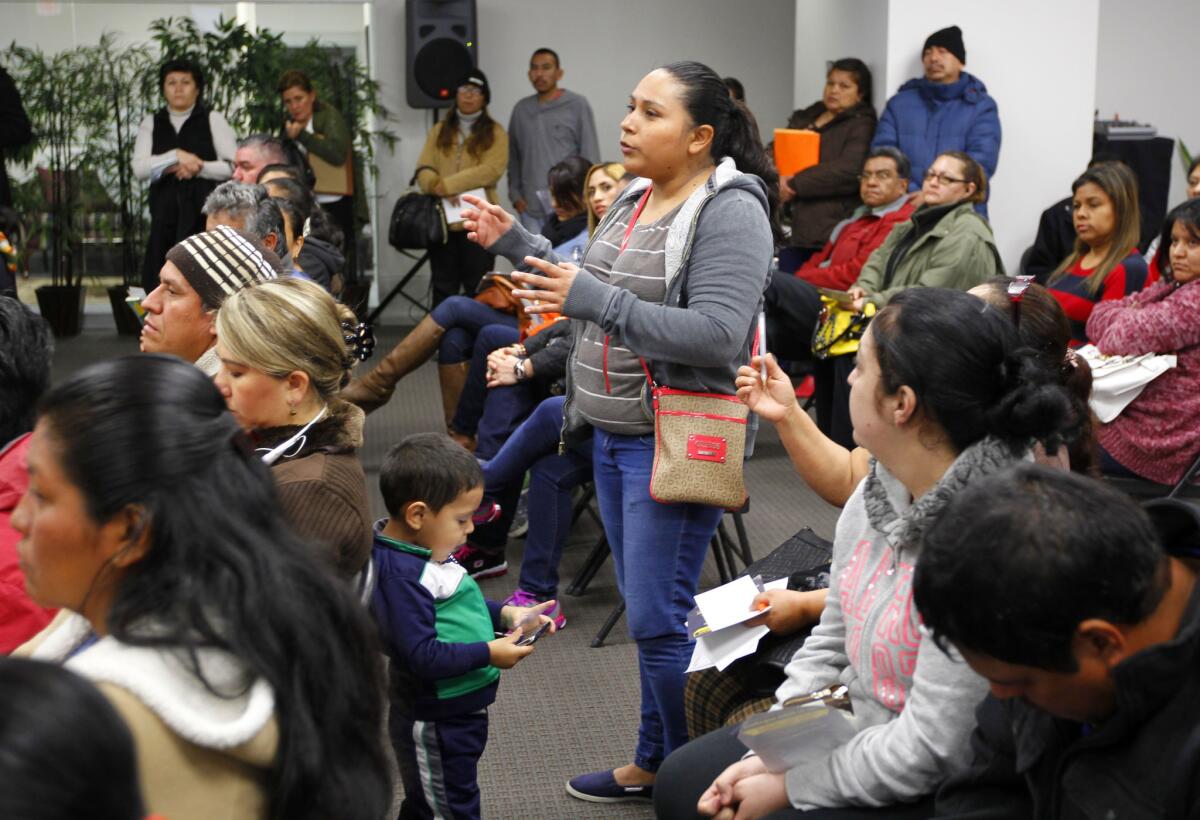In Obama administration’s legal fight on immigration, time is an adversary

- Share via
Reporting from Washington — In his fight to help millions of immigrants living in the country illegally, President Obama’s most implacable enemy may not be House Republicans or conservative governors, but the ticking clock.
A lengthy battle in a Texas court case could prove fatal for his plans to provide a temporary haven for up to 5 million people in the U.S. illegally. If the legal fight continues into next year, it will be difficult if not impossible for officials to process millions of applications before Obama leaves office.
The more people it can shield from the threat of deportation, the administration theorizes, the more difficult it would be for Obama’s successor to make a politically unpopular decision to roll back the programs.
Driven in part by this sense of urgency, the White House announced Friday it would seek an emergency stay of an order issued this week in Texas by U.S. District Judge Andrew S. Hanen that froze the programs.
Already, Hanen’s court order has complicated decisions for the administration and created fear and uncertainty for millions of potential applicants, even as immigrant groups were preparing to roll out a campaign to persuade people to apply. Many of those advocates, enraged by the delay, have been pressing the administration for a quick appeal.
“In my office there’s probably 20 people out there now waiting to see an immigration attorney, and none of them are reassured by what’s going on right now,” said Ellen Dumesnil, executive director of the International Institute of the Bay Area, which provides legal services.
“At the end of the day, they’re playing political football with people’s lives, and it’s just not right,” she said.
But the lawsuit, brought by 26 mostly Republican-led states, could take months to get resolved, even if the appeals go quickly, legal experts say.
For procedural reasons, Obama’s lawyers will first ask Hanen to stay his own injunction, though that is considered unlikely. That filing will come Monday, the White House said.
A stay would keep Hanen’s order from being in effect while the appeals in the case continue, allowing federal officials to resume their preparations for the immigration programs. White House spokesman Josh Earnest said the administration would also continue with an appeal to permanently overturn Hanen’s order, but the timing of that isn’t certain.
In a 123-page decision, Hanen ruled that Obama had not followed the law when he acted under his executive authority in November to allow immigrants to apply for a three-year permit to live and work in the U.S. without fear of being deported. The largest program would be open to up to 4 million adults who have lived here since 2010 and have children who are citizens or legal residents.
Though he ruled on narrow grounds — Obama’s failure to follow a law on federal rule-making — Hanen left no doubt that he thought the president overstepped his constitutional authority by bypassing Congress to set up the programs, calling them a “total abdication and surrender of the government’s statutory responsibilities” to enforce immigration law.
Hanen, who presides in federal district court in the border town of Brownsville, issued the ruling Monday night, less than 48 hours before immigration officials were scheduled to begin rolling out the first of Obama’s programs.
Even though his ruling wasn’t unexpected — Hanen has issued other opinions decrying a lack of immigration-law enforcement — Obama’s lawyers took days to decide whether to seek an emergency stay.
The delay reflected the tough options facing the administration. Were Hanen to refuse to lift his injunction, the White House could appeal quickly to the 5th Circuit Court of Appeals in New Orleans, which is dominated by Republican-appointed judges, and then to the Supreme Court. This option could yield a decision within weeks.
But it may be hard to convince a majority of the jurists on either court that the administration faces real and irreparable harm if the president’s immigration action is delayed. The Texas lawyers fighting the administration can argue there is no harm in deciding first whether Obama has the legal authority to change the status of several million immigrants.
The other option — slower but more likely to succeed — would be to appeal the judge’s decision that Texas has legal standing to object to Obama’s order. This conclusion was crucial to the judge’s ruling.
The administration’s lawyers could make a strong claim that the state of Texas is not hurt in any direct way because some people living there illegally obtain work permits.
But it could take many months, even two years, to finally win such a ruling, jeopardizing the effort to cement the programs’ existence during the Obama administration.
Ultimately, the need to get a decision quickly won out over fears of losing momentum with more denials.
One conservative legal scholar said the administration’s request was simply a nod to the immigration reform advocates who are part of the Democratic base.
“There’s no question that there’s a lot of pressure on all sides of this issue, and big dollars involved,” said John Malcolm, director of the Meese Legal Center at the Heritage Foundation. “I would think as a political matter they would want to be seen as moving as hard as they can as quickly as they can.”
joseph.tanfani@latimes.com
Times staff writer David G. Savage contributed to this report.
More to Read
Sign up for Essential California
The most important California stories and recommendations in your inbox every morning.
You may occasionally receive promotional content from the Los Angeles Times.











